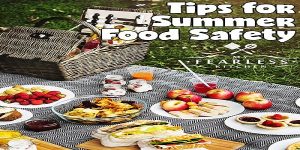When transporting food to a picnic, keep the following in mind:
Pack beverages in one cooler and perishable food in another.
Keep raw meats, seafood, and poultry safely wrapped so their juices don’t contaminate cooked foods or foods eaten raw, such as fruits and vegetables.
Rinse fresh fruits and vegetables under running water before packing. Scrub fruits and vegetables with firm skin under water while scrubbing with a vegetable brush. Dry clean fresh fruits and vegetables with a paper towel.
When traveling, keep refrigerants in an air-conditioned area of your car rather than in the trunk of a hot car. Determine how often to open the cooler.
Keep cold foods fresh. Place cold food in a cooler with an ice pack and keep it at 40 degrees Fahrenheit or below.
Cooking outside on a grill is another classic summer activity that many people enjoy. It is an opportunity to get together, have fun and eat well. There are a few safety tips to keep in mind when working on a grill in the heat of summer.
Note: Before cooking outdoors, remember to wash your hands! You can use wet towels or a jug of water, some soap, and paper towels.

While cooking, keep the following guidelines in mind:
Keep all utensils and dishes clean when preparing food.
Wash your hands after handling raw meat!
Use utensils to handle cooked meats.
Do not place cooked meat on surfaces that have raw meat.
Insert a meat thermometer in the middle of the meat to check the temperature and make sure the meat is fully cooked. To check the sausage, go from the end of the sausage to the center. Make sure not to pass the thermometer through the meat and touch the cooking surface, or you will get a false high temperature.
When serving food outdoors:
Remove all charred or burned pieces of food before eating.
Serve cooked meat first. Be sure to use food before the temperature drops below 140 degrees Fahrenheit and within two hours.
Hot foods should be stored at 140 degrees Fahrenheit or higher. Roll it up tightly and put it in an insulated container.
Cold foods should be placed on ice and kept refrigerated at 40 ° F or below.
Foods like chicken salad and desserts can be placed directly on the ice or in a shallow container that is placed in a deep skillet filled with ice. Drain the water when the snow melts and replace the snow frequently.
Do not let food out for more than two hours. On hot summer days (temperatures above 90 degrees Fahrenheit), limit one hour.
Do not reuse dishes that used to be raw meat unless they have been thoroughly washed with hot soapy water.
Wash your hands well before serving. Use a utensil when serving food.
More tips …
Keep trash cans covered to keep flies away. Immediately remove dirty meat wraps, dishes and trash.
Do not use fly spray or fly paper. They can contaminate food.
Keep all food out of the sun; Put it in the shade.
Keep plates, cups, utensils, and food covered until ready to use.
Do not touch the plates and cups where food is placed. Use handles for cups, edges of plates and the base of plates.
Keep long hair tied back or wear a hat to avoid hair loss on food.
Get enough tissue paper to wash your hands, the counter, and the picnic table.
It is important to keep your friends, family, and yourself safe from the health risks that accompany food preparation, transportation, and service. Following these food safety recommendations greatly reduces your risk of foodborne illness, so you can be sure of a happy and healthy outing.
Bonnie R. Geller is a Registered Dietitian, Certified Diabetes Educator, and Certified Intuitive Eating Counselor. She helps dieters, emotional eaters, people with medical conditions like diabetes, break the spell that dominates them with dieting and restore the WholeBody Trust ™ so they can live their lives to the fullest. To do this, she creates a custom solution that combines the three pillars of the WholeBody Trust ™: Mind Trust, Hunger Trust and Food Trust ™.


